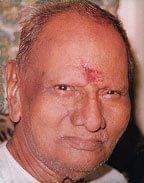Nisargadatta Maharaj On “Free Will”
Q: Surely, I am not the master of what happens. Its slave rather.
M: Be neither master, nor slave. Stand aloof.
Q: Does it imply avoidance of action?
M: You cannot avoid action. It happens, like everything else.
Q: My actions, surely, I can control.
M: Try. You will soon see that you do what you must.
Q: I can act according to my will.
M: You know your will only after you have acted.
Q: I remember my desires, the choices made, the decisions taken and act accordingly.
M: Then your memory decides, not you.
Q: Where do I come in?
M: You make it possible by giving it attention.
Q: Is there no such thing as free will? Am I not free to desire?
M: Oh no. You are compelled to desire. In Hinduism the very idea of free will is non-existent, so there is no word for it. Will is commitment, fixation, bondage.
Q: I am free to choose my limitations.
M: You must be free first. To be free in the world you must be free of the world. Otherwise your past decides for you and your future. Between what had happened and what must happen you are caught. Call it destiny or karma, but never—freedom. First return to your true being and then act from the heart of love.
Q: Within the manifested what is the stamp of the unmanifested?
M: There is none. The moment you begin to look for the stamp of the unmanifested, the manifested dissolves. If you try to understand the unmanifested wtih the mind, you at once go beyond the mind, like when you stir the fire with a wooden stick, you burn the stick. Use the mind to investigate the manifested. Be like the chick that pecks at the shell. Speculating about life outside the shell would have been of little use to it, but pecking at the shell breaks the shell from within and liberates the chick. Similarly, break the mind from within by investigation and exposure of its contradictions and absurdities.
Q: The longing to break the shell, where does it come from?
M: From the unmanifested.
